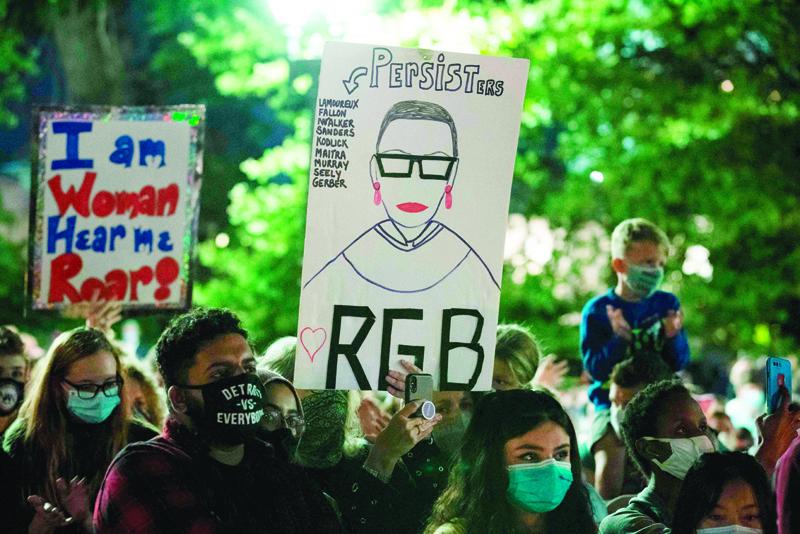
WASHINGTON: The death of Ruth Bader Ginsburg sounded a warning for American progressives, thousands of whom-wracked with ever-deepening concern for the future-gathered Saturday outside the Supreme Court in Washington to honor the late justice. As evening fell with a sudden September chill, a constant stream of families and young people gathered for a second night-just 45 days from the US presidential election-to pay homage to the progressive icon, affectionately referred to as "RBG."
"Ruth, I didn't know you, but you affected my life in many ways," says one of many letters placed at the foot of the court building, among flowers, rainbow flags and Ginsburg bobblehead figurines. A choir gave a concert, singing John Lennon's "Imagine" among other songs, as mourners lit candles and organizations representing liberal causes such as Black Lives Matter, gun reform and pro-choice groups handed out shirts, signs and stickers.
"This marks a seismic shift in the course for justice for our generation and will have a permanent effect on the history of what Generation Z does," gun reform activist David Hogg, who survived the Marjorie Stoneman Douglas High School shooting in 2018 said. Earlier, among the anonymous mourners, Democratic vice presidential candidate Kamala Harris wended her way discreetly to the front of the crowd. "RBG was one of my pioneers, an icon, a fighter. She was a woman in every way," she told AFP, shielding herself from the crisp September day with a black hooded sweatshirt.
Harris's running mate and President Donald Trump's opponent, Joe Biden, has failed to drum up great enthusiasm among progressive voters, due to his centrist views and advanced age - 77. But Ginsburg's death, in an America already on edge, could well galvanize them to his side. Massachusetts senator Elizabeth Warren addressed mourners from a podium, telling them: "This fight has just begun." Wearing a rainbow headband, J Ford Huffman, a gay man in his 70s, urged Democratic voters to "use the mourning period to energize ourselves" and make sure everyone votes on November 3.
The challenge will be to prevent the doyenne of the Supreme Court from being replaced with her ideological opposite, since Trump has pre-selected very conservative candidates. Ginsburg made her name in the 1970s by bringing down a series of laws that discriminated against women. Nominated to the country's highest court in 1993, she spent her 27-year tenure there defending the rights of the LGBT community and immigrants, establishing herself unequivocally as a champion of the American left.
'Vulnerable'
"Thank you for teaching us how to fight," Gina Eppolito wrote in chalk on the pavement outside the imposing white marble building in the US capital, a city known for its progressivism. The mother of two 11-year-olds, Eppolito said it was a "very big concern" of hers that rights acquired during her generation-particularly the right to abortion-might not be passed on to her children. With Ginsburg's death at age 87, the US Supreme Court could fall into the conservative camp for a long time.
"We are in an extremely vulnerable position," Eppolito said. Pam Crescenzo, 60, couldn't hold back tears as she spoke: "If the courts continue to tilt to the right, it's really going to be a difficult time to be a woman in America." Crescenzo, who came with her wife, said it was thanks to RBG that they had been able to get married. To her right, a group of people read out a Hebrew prayer. Ginsburg was born to a Jewish family in New York and died on the eve of Rosh Hashanah, one of the most holy days in Judaism.
In a sign of the deep divisions in the United States, a man wearing a black suit came to the court-to praise Trump. He was roundly booed away by the crowd. Many of the young people there also wanted to thank Ginsburg and to promise they would take up her fight. "We have a lot of work to do and a lot of fighting to do in the next 45 days," said Kiley Boland, 25, who clutched a book on Constitutional law under one arm. "It's on us now. She can rest; we got this."- AFP

